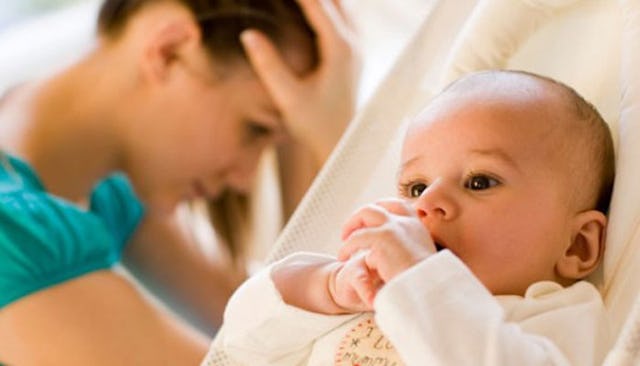My Journey with Postpartum Depression

“She’s a perfect angel.” That’s what the woman at the grocery store said the first time I brought my baby out to go shopping. She was awake in her carrier, smiling at strangers and cooing already. I wanted to say to that woman that she was wrong. My baby girl was not a perfect angel, especially when she was screaming three centimeters from my face at two in the morning. But then I felt horrible about thinking that, and my stomach knotted, and I wanted to crawl into a small dark place and cry.
“Thank you,” I said. I mustered a polite smile and moved on. I learned quickly that munchkin loved people—other people. She loved going out into the world, seeing new faces, hearing new voices. She loved movement. She loved motion. She loved light and noise and chaos. But between learning how to breastfeed, postpartum recovery, and my daily mid-afternoon cry, I couldn’t seem to muster the energy to leave the house. I spent my days sitting on the couch with her screaming at me.
“What a little cutie.” A waitress wiggled her finger in front of munchkin’s face. It was my first time out at a restaurant with her. She had just woken up from her nap. She smiled wide, her eyebrows raised, and her bright red hair caught the light. She was cute, beautiful even. But every mention of her cuteness made my breasts ache, not only from the endless cycle of engorgement and emptiness, but also from the force of her kicking and hitting my chest at each feeding, from her thrashing on me as I tried to burp her, from her volcanic meltdowns when my milk ran dry.
“Thank you,” I said. I held her tight and squeezed her cheeks. I didn’t know what I was doing. “Maybe this was a mistake.” I repeated those words to myself daily. I learned that breast milk stained my couch cushions, that munchkin’s mood would mirror mine, that there was no time to eat or bathe or sleep between feedings and diaper changes. The first words out of my mouth when I gave birth were “Oh my god, she’s beautiful.” The second words were “I don’t know if I want to do this again.” The second words echoed in my head, and I hated myself for saying them. This wasn’t munchkin’s fault, it was mine.
“If you want my advice,” a woman in the waiting room began. But I didn’t. Everyone had their tricks, their pointers, their hints. None of their words of wisdom told me how to stop crying when nothing was wrong. None of them told me how to feel like a whole person.
I breastfed her and let her sleep on my chest. She used my nipples as pacifiers, and listened to my heartbeat to calm her down. “She loves you,” my husband said. “She wants to be close to you.” I nodded. Every day when he came home from work she would smile wide for him. At home, with me, she would barely crack a grin. He made her happy, he held her without her pushing against him, he changed her diaper without her screaming. He was the good parent.
“I think I have postpartum depression,” I said.
I repeated those words to my husband, to my mother, to my father, to my friends, to my doctor.
Each time I said them, I felt better. Each week, I cry less. Each day, I feel better.
It took me eight weeks of sobbing to convince myself to say those words. Another two weeks before I let myself call my doctor. I got help. I look at munchkin now and smile, and she smiles back. One day soon, all I’ll remember are the smiles.
This article was originally published on